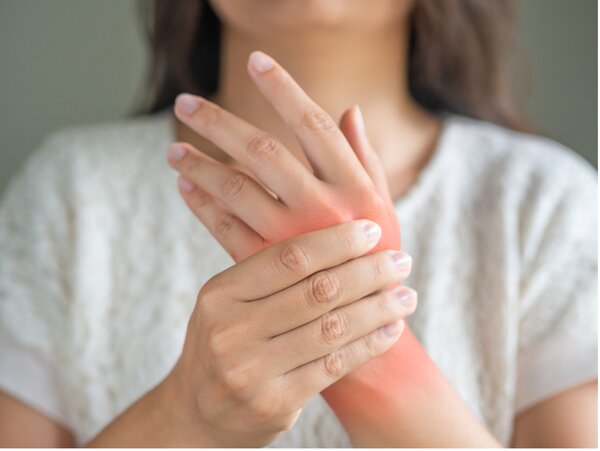Most women are aware of “classic” menopause symptoms such as hot flashes. Yet menopause is a unique experience for everyone, and no two women experience menopause the same way. In fact, there is a whole list of unusual symptoms that can point to menopause that you might never have heard of!
Before we dive into that list, a note: If you think that you might be going through menopause, it’s still important to see your doctor to get your symptoms checked out and rule out potential underlying causes. For instance, multiple symptoms on this list can also be a sign of hyperthyroidism. Even if you do turn out to “just” be going through menopause, it’s still worthwhile to see a doctor so you can get relief for your symptoms and improve your quality of life. We know more about menopause than ever before and there are lots of menopause relief products and therapies available.
Without further ado, here are 17 uncommon menopause signs that every woman should know about:
1. Cold Flashes
Hot flashes are much more common, but it’s not unheard of to get cold flashes during menopause. Fluctuating hormone levels affect your body’s thermoregulation system, which can cause you to have a sudden onset of chills instead of a hot flash. Cold flashes can also occur after a hot flash as your body tries to bring your temperature back to equilibrium.
2. Insomnia
Your sleep problems might not be caused by stress. Difficulty falling and staying asleep is common during menopause due to both hot flashes and increased neurological excitability. This sleep deprivation often leads to fatigue, which is compounded by your body trying to adjust to lower levels of estrogen.
3. Body Odor
Your body odor can change for many reasons during menopause, including increased sweating from hot flashes and changes in your vaginal discharge. This is totally normal, but you can talk to your doctor about solutions if the smell really bothers you.
4. Bloating And Indigestion
If you’ve been experiencing an increase in stomach problems, including bloating, indigestion, acid reflux, and tummy aches, that pizza you ate might not be to blame. Fluctuating hormone levels can trigger these symptoms years before your period officially stops.
5. Dry Eyes
During menopause, the glands in your eyes reduce their production of both moisture and oil, which can cause your eyes to dry out. Regular use of eye drops will help ease your symptoms, and running a humidifier indoors can also help, especially if you live in a dry climate.
6. Skin Changes
Your eyes aren’t the only things that might feel dry. Many women experience thinner, drier, itchier skin during menopause due to reduced oil production and decreased collagen. Women may also experience hormonal breakouts, even if they have never had acne before, thanks to their fluctuating hormone levels.
7. Hair Changes
Some women also experience hair thinning or loss during menopause, which is caused by having comparatively higher levels of androgen once their estrogen starts dropping. Changing up your hair care routine and easing up on damaging chemical or heat treatments can help revitalize its appearance.
8. Allergies
Falling hormone levels can sometimes trigger your body to increase histamine production. An unfortunate side effect of this is the worsening of existing allergies, or the development of new allergies that you never had before.
9. Burning mouth
A significant minority of menopausal women experience this sensation, in which their tongue and/or mouth burns or tingles without apparent cause. This sensation is often accompanied by a bitter or metallic taste. The sensation and taste may linger, or it may come and go at random.
10. Neurological Symptoms
The fluctuating levels of menopause can lead to a variety of unusual neurological symptoms, including unexplained dizziness, ringing in the ears (tinnitus), tingling sensations on the skin, and the sensation of “electric shocks” preceding a hot flash.
11. Breast Pain
Your breasts can swell and become tender around your period, and this can also happen during menopause. Other women actually experience a loss of fullness in their breasts instead as their milk ducts and glands shrink. You might also notice that your breasts begin to sag more, which happens as they become more dense and less fatty due to age.
12. Vaginal Dryness
Reduced hormone levels plus age cause the tissues in your vaginal area to become thinner, drier, and less flexible. This can lead to pain during sex, burning and/or itching sensations, the constant urge to urinate, and vaginal bleeding and discharge.
13. Urinary Problems
That thinning, weaker tissue can have another side effect: bladder leakage and difficulty urinating. This is also more common in women who have given birth vaginally, which stretches out the pelvic muscles and tissues, but it can happen to anyone.
14. Achy Muscles And Joints
Estrogen helps keep inflammation under control, so when your estrogen levels drop, you may experience increased inflammation in your body. This can manifest as achy muscles and joints and intensify other related conditions such as arthritis, which are common as you age.

15. Headaches
Some women experience headaches around their periods, and this can also happen during perimenopause and menopause as well. These may run-of-the-mill headaches or serious migraines that make it difficult to live daily life.
16. Brain Fog
Some short-term memory loss is to be expected with age, but it’s not only caused by getting older. Some women find it hard to think, concentrate, and recall during menopause due to sleep disturbances, as well as changing hormone levels.
17. Rage
Mood swings are common whenever your hormone levels change, but some women experience unexplained feelings of irritation, frustration, and even rage when going through menopause. These feelings can be intensified by disturbed sleep and ongoing fatigue.
If you want relief for menopause symptoms, ask your doctor about your options. Whether it’s a short-term solution like Always discreet pads for bladder leakage, or a long-term solution like hormone replacement therapy for hot flashes, there are treatments available that can help you get through menopause.


























